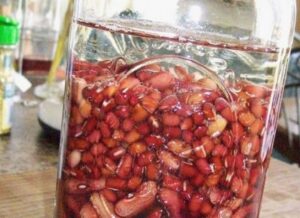Sprouted Grains, Beans, Nuts and Seeds: Are They Healthier?

Your pantries are (hopefully) filled with healthy, versatile staples in the vein of whole grains, beans, legumes, nuts and seeds. They play crucial roles in a well-rounded diet, providing protein, fiber, vitamins, minerals and potent antioxidants. And according to one school of thought, sprouting them reduces certain health risks and enhances the benefits, too.
Nuts, seeds, beans and grains contain enzyme inhibitors, according to Raw-Food-Living.com. Enzyme inhibitors are both digestive enzymes and metabolic enzymes that help us to break down food and perform our biological processes. In these particular foods, the enzymes serve to protect and preserve it until it’s in an environment where it can grow; but for us, they can inhibit our body’s own, important enzymatic activity. Sprouting helps release the enzyme inhibitors and make it easier for us to assimilate nutrients, because if you haven’t already guessed, we love to make things way more complicated than the rest of nature, right? While we’re conditioned to think canned beans and Planter’s salted nut assortments = healthy, even our Neanderthal ancestors figured out that soaking and sprouting these foods made them a whole lot better for our bodies. Cue that GEICO commerical caveguy saying “I told you so.”
Enzyme inhibitors in nuts may bind to the enzyme and can prevent proper molecular binding, which can lead to a domino effect of pulling vital nutrients out of other functions in the body. Grains in particular contain something called phytic acid, which can block the absorption of certain minerals, including calcium, magnesium, copper, iron and zinc. Too little calcium, for example, can mean big trouble for our bones, especially for women after menopause (as if they don’t already have enough problems). Sprouting, which is essentially, soaking the (nuts, seeds, beans and) grains, can help to produce our gut BFF—that friendly digestive bacteria—which aids in breaking down phytic acid as well as the enzyme inhibitors. This can also replenish B vitamins, which are crucial nutrients to keep us sane and focused. The soaked foods also help us to better digest proteins and gluten, and it keeps our lovely intestinal lining working so well that it’s worthy of bragging. This healthy digestive state means we can experience a whole slew of other health benefits like enhanced immune performance, boosts in our energy levels and focus, and probably some sort of protection against zombies or vampires. Probably.
So, how to sprout?
If fluffy alfalfa sprouts common on sandwiches and salads comes to mind, it’s understandable, but not quite what we’re talking about here. We’re not sprouting until green shoots come out, although you can do that, too.
Like many ancient cultures found, soaking grains, beans, nuts and seeds in a slightly acidic warm water for 7 to 24 hours will make the foods more easily digestible and healthy. Softer nuts and legumes like lentils can soak on the shorter side, while heavier beans, grains and larger nuts do best when soaked longer.
Try adding a teaspoon of vinegar or lemon juice to every quart of water for soaking. Cover your soakings—but not airtight. A cloth or dishtowel will keep pests and dust out just fine. Most soaked foods will at least double in size—if not triple—so make sure you’re checking the water level every few hours. Then cook or prepare as normal.
For nuts, you’ll want them to dry out before snacking, unless you’re blending them. You can do this in a dehydrator or in an oven at the lowest temperature. They’re prime now too for adding your favorite spicy, savory or sweet seasonings.
Keep in touch with Jill on Twitter @jillettinger
Image:jazzijava

